| 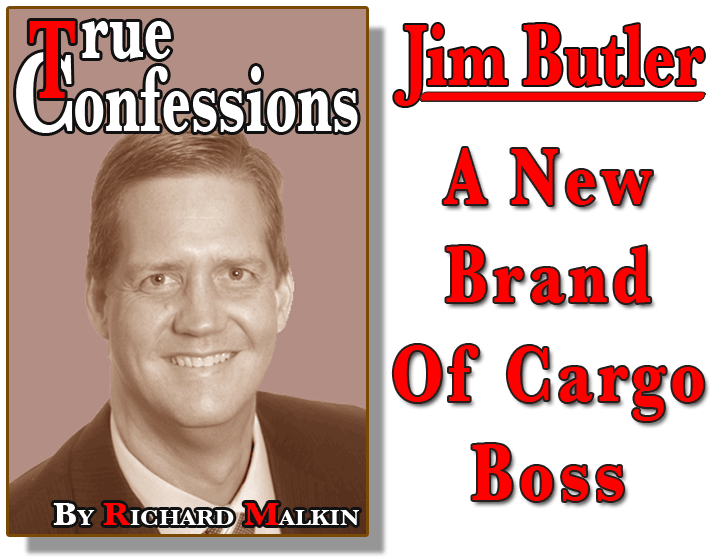
At first blush, it appears
that Jim W. Butler 42-year-old president of American Airlines Cargo is
not much of a desk man. In his first year as the airline’s top cargo
officer, he logged close to 200,000 miles touching base throughout its
domestic and international systems, which he acknowledged left him somewhat
“terrified”.
He felt encouraged that the flights enabled
him to effect personal contact with many people “who deliver service
to our customers every day”.
Of equal importance was the opportunity
to interact with a large number of customers.
In a period of an improving U.S. economy
and widespread softening abroad, how does American interpret the challenges?
This, said Butler, was precisely what he has devoted considerable time
to, “especially in the past few months”.
He drew attention to a particularly “interesting
aspect” of the air transportation business is that the “ebbs
and flows” of global economies suggest a vital requirement: “Be
prepared to act on the next opportunity.” Underscoring this remark,
American’s cargo chief added:
“Our network places us in a unique
position to do so as we are able to link the largest freight entities
in the world together, and that requires us to constantly be mindful of
optimizing the mix on our aircraft.”
When a decision is to be made on how to
optimize the mix on the aircraft, an unusually large number of factors
are taken into account—for example, to name just a few: currency
fluctuations, upline and downline demand, short-term versus long-term
opportunities. How does the airline react when challenges appear? The
airline quickly shifts focus and looks to see “where the next great
piece of business might come from”.
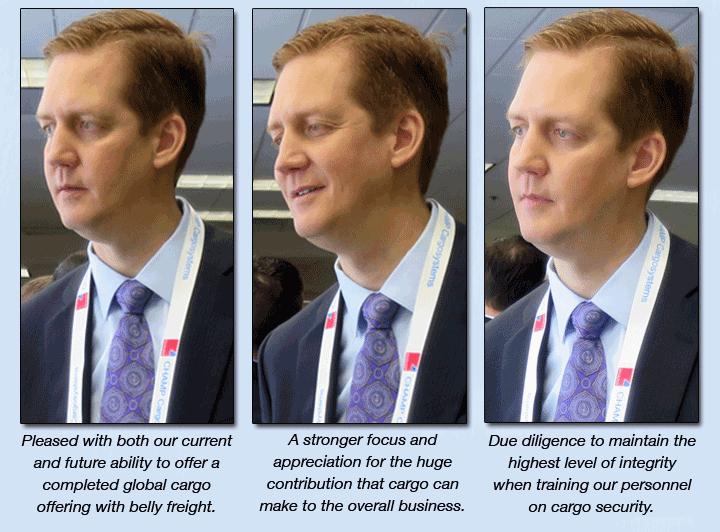 |
Asked whether American found
certain markets exceptionally troublesome, Butler acknowledged that American
is not without its challenges,” but avoided specifics. Had American
been a cargo airline instead of a passenger carrier “first and foremost,”
its network would look different. He went on to point out that at the
“new American” there exists “a stronger focus and appreciation
for the huge contribution that cargo can make to the overall business”.
The all-cargo plane stands prominently in
the carrier’s early history. Does the absence of freighters impact
marketing plans? The query produced an emphatic No. The answer lies in
the reality that American schedules a broad range of domestic and international
destinations, in numerous instances multiple frequencies a day to cities
which its customers need most. This was underlined by the airline’s
service to 38 Latin American countries, including 34 “unique”
cities in central and South America. What
follows is the combining that international network with “the largest
U.S. domestic network, again with the certainty of a scheduled carrier”.
At points where American does not offer service, it partners with other
carriers.
Butler expressed confidence in American’s
ability to do this will continue to grow. He noted that the first of 42
firm 787s is in American’s possession. Its 777-300ER fleet is being
expanded to 20. And down the road are 22 A350s referring to the addition
of the purchased Airbus as well as Boeing jet transports. Butler stated:
“I am very pleased with both our current
and future ability to offer a completed global cargo offering with belly
freight. I know it may sound like spin, but to date I have never sat around
wishing we had freighters—beyond, of course, our minifreighters.”
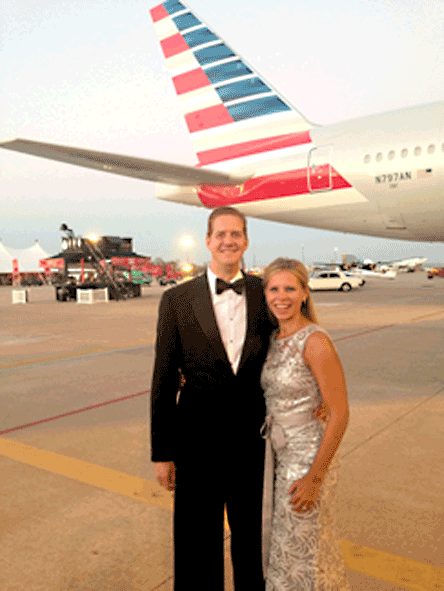 Pride and achievement are stepping stones
to tradition in the professions. Paraphrasing Romaine, tradition is the
seed of future deeds. The “future deeds” are now in constant
play in the hands of Jim Butler, third-generation member of a transportation-linked
family, which began with his grandfather who ran a Latin American airline
and continued that orientation to son and grandson.
Pride and achievement are stepping stones
to tradition in the professions. Paraphrasing Romaine, tradition is the
seed of future deeds. The “future deeds” are now in constant
play in the hands of Jim Butler, third-generation member of a transportation-linked
family, which began with his grandfather who ran a Latin American airline
and continued that orientation to son and grandson.
“I honestly think that transportation
is in your blood,” said Butler who lost no time in making a beeline
for American Airlines after graduating from college.
A native of Summit, New Jersey, he spent
most of his early years in Connecticut (except for a four-year break in
Lausanne, Switzerland where he became addicted to skiing), and currently
makes his home in Lewisville, Texas where he resides with his wife, Sharon,
and their two children, Alex and Reagan. His educational background includes
a BA from Cornell University and an MBA from the J.L. Kellogg School of
Management at Northwestern University.
Since joining the airline 19 years ago,
Butler worked in a variety of jobs encompassing sales, marketing, pricing
and finance. This included revenue management positions for both American
and Aerolineas Argentina’s interactive marketing and global sales
planning and analysis. Prior to ascendency to his present office, Butler
served as managing director of commercial planning and performance.
American’s cargo sector shows a split,
by origin, favoring international versus domestic, 60-40%. Cargo’s
share of total mainline revenue at American hovers between 2-3%. Butler
was quick to point out that while this number is “typically small”
for U.S. carriers, “it is a significantly larger part of widebody
operations or as a percent of our international network”. Intent
on presenting his company in its true competitive colors, he stated:
“Honestly, due to the heavy domestic
networks that are somewhat unique to the United States, looking at it
from one of those perspectives tend to provide a better comparison with
many other cargo operations around the world.”
How deeply has the economics of air freight
shipping penetrated the know-how of the average shipper? Are there still
gaps in their decisionmaking? Butler labeled the answer to the latter
question “likely”. How, then, to deal with the problem? Despite
air freight’s initial outlay of cash, he observed there are many
situations when it is “absolutely critical for getting goods to
market or keeping a factory running at peak efficiently.” It is
at this point, when the shipment shows up in American’s possession,
that it seizes the opportunity to “tell our story, demonstrate our
value inside the supply chain, and perhaps end up with a regular customer,
not just a one-time shipper”.
Well, what about those reports of air shippers
who have reverted to surface transportation?
Butler noted that modal shifts have long
been a “risk” in transportation, especially since the competing
modes have achieved “great strides”. The other side of the
coin, however, is that the demands of the global economy have also undergone
change,” and their requirements to have goods on hand quickly isn’t
going away! There’s no question that some reversion “makes
sense.” There are more than a few new air freight customers.
At this point, Butler’s thoughts broadened
to express the conviction that American’s job as an industry is
to “partner together to add the type of premium information flow
that would naturally accompany the speed of delivery advantage that we
have”. When that can be accomplished, he felt, “our value
proposition will be even clearer”.
 Is
there any truth in the suggestion that an ascending airline employee can
ultimately reach a level that is regarded as a profession? Butler was
apparently uncomfortable with the gilded job status. Asserting that he
is unaware of the existence of a specific level, per se, but he prefers
the reference to “a level of commitment”. Once again, the
question inspired a somewhat lengthy interpretation of “profession”
as it related to American Cargo. One of his satisfying discoveries when
he moved into cargo was the high level of experience possessed by the
team “at all levels”. Parenthetically, he commented that team
members are “typically” seeking to transfer into the cargo
division “than the other way around”. (This was a reference
to a much earlier period in airline history when many cargo employees
sought transfer to the more glamorous side of the business, travel.).
Still, does commitment add up to a profession? Said Butler: Is
there any truth in the suggestion that an ascending airline employee can
ultimately reach a level that is regarded as a profession? Butler was
apparently uncomfortable with the gilded job status. Asserting that he
is unaware of the existence of a specific level, per se, but he prefers
the reference to “a level of commitment”. Once again, the
question inspired a somewhat lengthy interpretation of “profession”
as it related to American Cargo. One of his satisfying discoveries when
he moved into cargo was the high level of experience possessed by the
team “at all levels”. Parenthetically, he commented that team
members are “typically” seeking to transfer into the cargo
division “than the other way around”. (This was a reference
to a much earlier period in airline history when many cargo employees
sought transfer to the more glamorous side of the business, travel.).
Still, does commitment add up to a profession? Said Butler:
“As long as you are passionate about
helping us win and deliver on what we promise customers, you have found
yourself a strong profession in my book.”
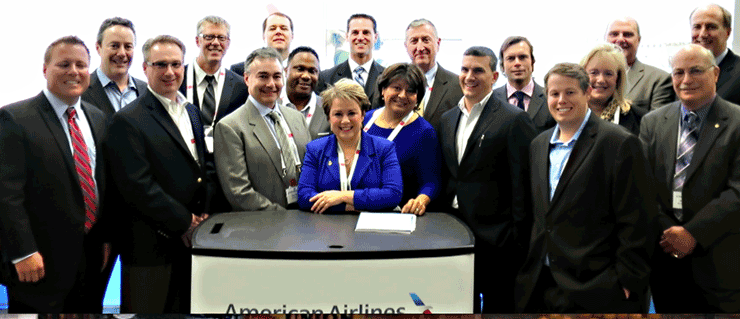 |
Price? Service? Where does the average customer
direct his primary concentration?
The reply was fast and in a single syllable,
“Both.” He held that a “true cargo provider” must
offer an assortment of prices and products “based on the certainty”
customers need and expect. Then, too, there is the offer of additional
services “within the product suite” that addresses the element
of cargo handling.
In bygone years, one of the lessons in everyday
morality was to let thy discontents be thy secret. This bit of advice,
however, has not extended to the discontented customer. According to Jim
Butler, customers demand deliveries arrive safely on time, plus “relevant
and reliable information during the process.” He noted that there
is quick customer feedback if the airline is unable to deliver in certain
key areas. To which Butler stated: “Honestly, it is not too much
to ask, and we as an industry need to do the best job possible, to not
only deliver well today, but to consistently invest and innovate to evolve
in these areas.”
Turning to the topic of air cargo security,
American Cargo’s president pointed out that with ever-changing domestic
and international threats, the carrier shuns complacency with security,
searching for ways to boost the “cargo security process”.
American is putting together customer profiles leveraging shipping history
and cooperating with regulated authorities to safeguard the supply chain.
On the question whether American is experiencing
new security pressures, he conceded that “there’s growing
concern of inside security threats. The result is “due diligence
to maintain the highest level of integrity when training our personnel
on cargo security”.
When Butler was asked whether he detected
hints of industry peril in the future, he remarked that, as an industry,
it is of vital importance to be “even more focused than we are today
of proving value-added services, ease of use, online engagement and soon”.
As for the flow of information, the top needs are greater accuracy, efficiency,
and availability for analysis. Absence of these improvements will reshape
an industry that is “less relevant in the future”.
Insofar as the airline’s marketing
and sales planning are concerned, how big a role do the forwarder and
cargo agent play? Butler cited the merger of American Airlines Cargo and
US Airways Cargo. Highlighting numerous
benefits of the airlines’ marriage, he stated that a large part
of that was “leveraging the partnerships with forwarders that each
carrier brought to the table”.
Commenting on the long drive toward a paperless
freight system, Butler waxed optimistic. Declaring that the effort has
finally “grabbed hold,” he explained that to assure a project
of this magnitude works, “you need buy in from all responsible parties—in
this case, airlines, forwarders and regulators—and a clearly defined
end goal and achievable tasks”. With reference to the latter, he
said it required “realization” by all parties that the end
game is a clear, simple process—a path starts with the air waybill.
Once there is agreement on these principles, he said, “we could
all focus on achieving it”. For American Airlines Cargo, it is a
“critical priority”.
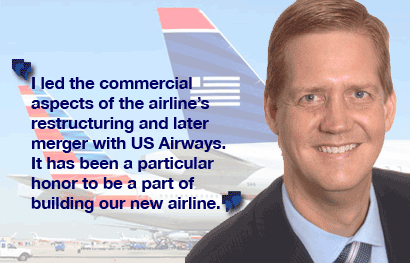 The action the airline has taken is a concentrated
campaign to educate its team on the vital need to “go digital”
and relying on the team to “communicate the value” to the
carrier’s customers. To date, progress has been highly satisfactory.
However, because those objectives were “a bit behind” other
goals, Butler decided against introducing “the complexity of major
change into the business”. Now, in 2015, the airline is engaged
in setting “loftier benchmarks” which are designed to propel
the organization toward command of the momentum.
The action the airline has taken is a concentrated
campaign to educate its team on the vital need to “go digital”
and relying on the team to “communicate the value” to the
carrier’s customers. To date, progress has been highly satisfactory.
However, because those objectives were “a bit behind” other
goals, Butler decided against introducing “the complexity of major
change into the business”. Now, in 2015, the airline is engaged
in setting “loftier benchmarks” which are designed to propel
the organization toward command of the momentum.
It’s no great secret that the traditional
route to an airline’s top cargo office is via the cargo department,
on the strength of incremental stages. Butler is a significant exception,
and he considers himself lucky to have worked in many areas at American
and many locations around the globe. This may raise a lot of cargo eyebrows,
but he declared that at each now location he was taught “different
lessons that I bring to cargo”. Providing details of his pre-cargo
experience, Butler said:
 “I had strategic responsibility for
American’s fleet and commercial strategy, and led the commercial
aspects of the airline’s restructuring and later merger with US
Airways. It has been a particular honor to be a part of building our new
airline, and I could not be more thrilled to mix the background I have
had on the passenger and finance side of the airline with the incredible
experience and passion our team has within the cargo organization.”
“I had strategic responsibility for
American’s fleet and commercial strategy, and led the commercial
aspects of the airline’s restructuring and later merger with US
Airways. It has been a particular honor to be a part of building our new
airline, and I could not be more thrilled to mix the background I have
had on the passenger and finance side of the airline with the incredible
experience and passion our team has within the cargo organization.”
In more relaxed spirit, the president of
American Airlines Cargo confided his love of spending time with his six-year
old son and five-year old daughter “as they are growing up”.
Fully aware that the nature of air transportation business requires commitment
to work, he also bears in mind a piece of advice given to him a while
ago: “No one ever looked back at their life and said that they wished
that they had worked more, but they certainly look back to say that they
didn’t spend enough time with the family,” which underscores
his determination to maintain a “healthy balance” whenever
the possibility exists.
Richard Malkin
 |
malkin101@aircargonews.com |





